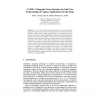Free Online Productivity Tools
i2Speak
i2Symbol
i2OCR
iTex2Img
iWeb2Print
iWeb2Shot
i2Type
iPdf2Split
iPdf2Merge
i2Bopomofo
i2Arabic
i2Style
i2Image
i2PDF
iLatex2Rtf
Sci2ools
HUC
2004
Springer
2004
Springer
CAMP: A Magnetic Poetry Interface for End-User Programming of Capture Applications for the Home
As the trend towards technology-enriched home environments progresses, the need to enable users to create applications to suit their own lives increases. While several recent projects focus on lowering barriers for application creation by using simplified input mechanisms and languages, these projects often approach application creation from a developer’s perspective, focusing on devices and their interactions, rather than users’ goals or tasks. In this paper, we present a study that examines how users conceptualize applications involving automated capture and playback of home activities and reveals a breadth of home applications that people desire. We introduce CAMP, a system that enables end-user programming for smart home environments based on a magnetic poetry metaphor. We describe how CAMP’s simple interface for creating applications supports users’ natural conceptual models of capture applications. Finally, we present a preliminary evaluation of CAMP and assess its abilit...
| Added | 01 Jul 2010 |
| Updated | 01 Jul 2010 |
| Type | Conference |
| Year | 2004 |
| Where | HUC |
| Authors | Khai N. Truong, Elaine M. Huang, Gregory D. Abowd |
Comments (0)

